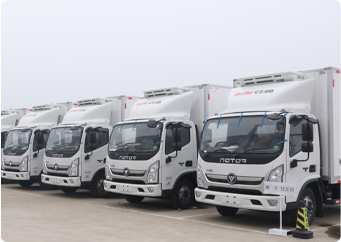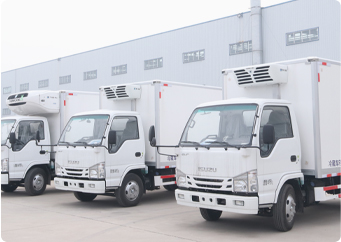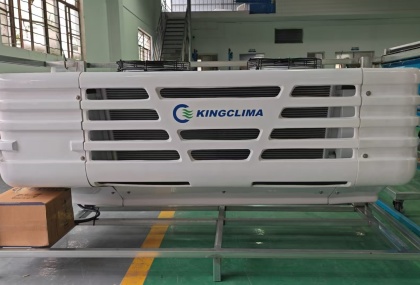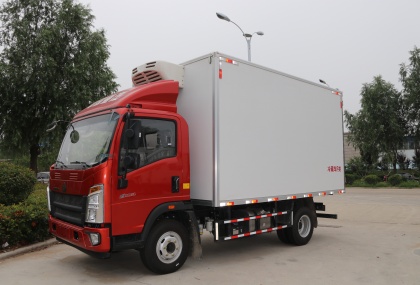How Truck Refrigeration Units Work
Truck refrigeration units (commonly referred to as reefer units) are essential for transporting temperature-sensitive cargo such as food, medicines, chemicals and flowers, etc. These devices ensure that the goods are maintained at the desired temperature throughout transport, preventing deterioration, contamination or degradation.
The following is a detailed description of the working principle of the truck refrigeration unit:
1. Temperature Control and Monitoring
Truck refrigeration units are equipped with sophisticated temperature control systems to ensure the proper conditions are maintained throughout the transport. Key features include:
a. Digital Thermostats and Sensors
- Modern truck refrigeration units often feature digital thermostats and temperature sensors inside the cargo area. These systems help to maintain precise temperature settings for sensitive goods.
- Temperature Alerts: Many systems are equipped with real-time temperature monitoring and alert systems that notify drivers if the temperature deviates from the set range. These systems ensure product integrity is maintained.
b. Remote Monitoring
- Some advanced truck refrigeration systems are integrated with telematics, allowing fleet managers to monitor the temperature, performance, and status of each refrigeration unit remotely in real-time. This feature helps reduce risks of spoilage and enhances the overall control over the supply chain.

2. Defrosting and Deicing
- Defrost Function: To maintain efficient operation, some truck refrigeration units have an automatic defrost system to remove ice or frost buildup on the evaporator coils, which could hinder airflow and reduce cooling efficiency.
- Deicing: In extreme cold weather conditions, the unit may need to periodically defrost to prevent ice buildup, ensuring it continues to run smoothly.
3. Efficiency and Fuel Economy
a. Energy Efficiency
- Many truck refrigeration units are designed to be energy-efficient, reducing the load on the truck’s engine or battery. Newer models feature improved heat exchange technology and insulation that minimize energy consumption while ensuring precise temperature control.
b. Fuel Consumption
- Engine-driven units typically use fuel from the truck's fuel tank to power the refrigeration system. However, some modern systems, especially electric-powered or hybrid models, aim to reduce overall fuel consumption and emissions, making them more sustainable for long-term use.

4. Safety and Regulations
- Compliance with Safety Standards: Truck refrigeration units must comply with local and international safety standards (e.g., ISO 9001, FDA regulations, HACCP, and others) to ensure the safe transport of perishable goods. This includes the use of approved refrigerants and compliance with environmental regulations regarding emissions.
- Refrigerant Leaks: Proper maintenance is crucial to prevent refrigerant leaks, which can be dangerous to the environment and the system's efficiency.
Conclusion
Truck refrigeration units are a vital part of modern logistics, allowing for the safe and efficient transport of temperature-sensitive goods. These units work through a continuous refrigeration cycle that involves compressing, condensing, expanding, and evaporating refrigerant to maintain the desired temperature. By understanding how the system works and maintaining its components, you can ensure that the refrigeration unit operates effectively, keeping your goods fresh and safe during transportation. Whether engine-driven, electric, or hybrid, modern refrigeration units are designed to offer energy efficiency, precise temperature control, and reliable performance.
As a professional truck refrigeration unit supplier, Kingclima offer 7*24 professional and patient help, if you need, please contact us at any time.
-
From Farm to Table: Trust Our Refrigeration Systems to Deliver Freshness!
2025-09-26 15:23:09
The journey of perishable goods—from farm harvests to grocery shelves—demands precision, reliability, and unwavering temperature control. Any breakdown in the cold chain can result in spoilage, financial losses, and compromised food safety. That’s why leading logistics providers and food distributors rely on advanced truck refrigeration systems to ensure their cargo arrives fresh, safe, and market-ready.
read more
-
Don’t Let the Heat Spoil Your Haul – Try Our Advanced Refrigeration Systems!
2025-09-26 14:55:58
In the world of perishable freight, temperature control isn’t just a feature—it’s a necessity. Whether you're transporting fresh produce, dairy, pharmaceuticals, or frozen seafood, a single degree of deviation can mean the difference between profit and loss. At kingclima, we engineer high-performance truck refrigeration systems that combat heat, humidity, and harsh conditions—ensuring your cargo arrives in pristine condition, every time.
read more
-
Reliable Cooling for Every Mile – Explore Our Truck Refrigeration Range!
2025-09-25 16:15:32
At kingclima, we understand that your refrigerated cargo represents more than just inventory - it's your reputation, your customers' trust, and your bottom line. Our comprehensive range of truck refrigeration systems delivers military-grade reliability combined with cutting-edge technology to protect your temperature-sensitive shipments across every mile of their journey.
read more


.jpg)

